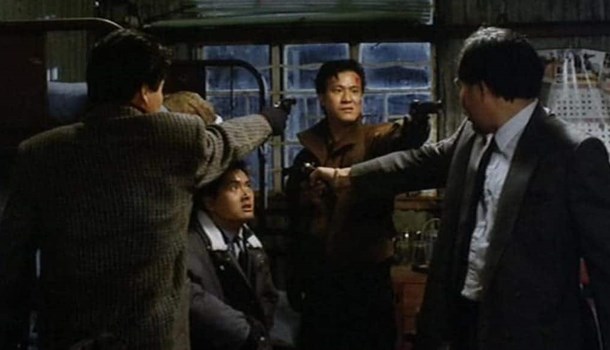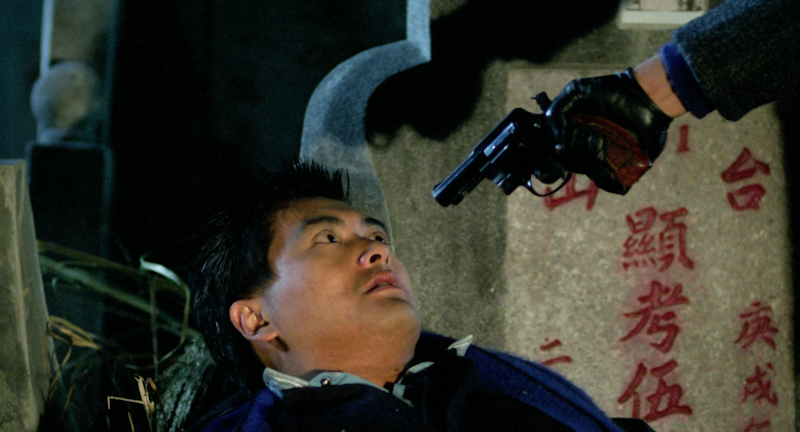
Written by Richard Durrance on 25 Nov 2025
Distributor Arrow • Certificate 18 • Price £18.00
One of the "Blu-Ray mysteries" of the last decade or more was just why certain Hong Kong cinema titles were not available on the format. Yes, many of them had seen the light of day on DVD, but huge swathes have yet to make the leap to Blu-Ray or 4K. Does City on Fire suggest the floodgates are about to open?
For many of my generation, Hard Boiled was one of the holy grails as a teenager, especially a version that was both watchable (i.e not dubbed) and not panned & scanned but in glorious HD. The Killer, Woo’s homage-cum-remake to Melville’s Le Samurai is equally absent. The same was true of Ringo Lam’s 1997 City on Fire, itself a film famous but often more for how Tarantino ripped it off to make Reservoir Dogs (some may balk at this description, as Tarantino makes more of the latter stages of the film, but really without City on Fire there is no Reservoir Dogs in my opinion. Which you'll hear more of later).
The long wait was revealed to be over several months ago when Arrow announced that they had sub-licensed the films of Golden Princess, which has a "license all films" policy which means, thankfully, more is coming!
I’ve not seen City on Fire for some 20 years now, but a late request for a screener disc left me floored. There were some remaining! (I’d expected to hear they had all gone). Though I had been working my way through the Nagisa Oshima boxset, a proper bout of (non-man) flu left me totally lacking in energy so I needed something entertaining but not as likely to challenge my brain as Oshima. And so I went with Lam’s film.
Undercover cop, Ko (Chow Yun-fat) wants both out of his fake life and to marry his girlfriend, Hung (Carrie Ng). But Inspector Lau (Sun Yueh), though conflicted, needs him to help find a gang that has ripped off a jewellers. Meanwhile, a younger inspector (Roy Cheung) is brought in, pushing Kung aside, just at the time that Ko is able to sell guns to the gang and is brought into a new robbery while creating a friendship with criminal, Fu (Danny Lee).
There is something very 80’s about City on Fire, from the early synth soundtrack that morphs into sax, this is of its time but that’s no bad thing. But let’s put something straight to bed. Though an influence on Reservoir Dogs (and that film lifts sequences and scenes from a few films, usually the most famous are directly taken from City on Fire, including the villains aiming guns at each other – see my earlier comments), this is a more rounded film though, which while working with the mechanisms of heists, the focus is more clearly on Chow Yun-fat's Ko and his relationships, therefore painting a more human story, unlike Tarantino’s violence as aesthetic; out for style without much context work.
Some of this works in the film’s favour, certainly Ko’s relationship with Inspector Lau brings a richness and his relationship to Fu is similar to Tarantino’s film. It also brings difficulties. Ko and his girlfriend, Hung, exists for a specific purpose, which is to humanise Ko. Due to the nature of the job, you could possibly lose some sympathy with Ko because his character has the age-old problem of struggling to separate his real and fake lives while undercover. It feels a bit tacked on at times, it also introduces some humour that does not always sit well tonally (and honestly didn’t when I last saw the film) and at times can feel like it’s bordering towards being a little misogynistic (if unintentionally) or at least demeaning. Or, rather, Hung’s character really only exists to prove that Ko is a good guy, who wants something better in life than being around criminals. The film would have done better to kick this stuff out, in part perhaps because Ringo Lam never feels quite as confident when directing those scenes. It feels laboured, or as if he’s disinterested in it. There’s no lightness of touch to it that, say, Woo brings to the relationship in Hard Boiled or the ability to make the human dramatic in the way Johnnie To does (an underappreciated director perhaps, by me, too, I have to say, as every time I watch To’s work I’m impressed and Exiled is a masterpiece – so give us a Blu-ray now or else the bunny gets it: 5, 4, 3, 2, 1... sorry bunny).
Lam is far more confident when working with the action, the tension, the chase and those scenes between Ko and Inspector Lau, where he excels. Likewise, with images of Hong Kong; this is his time and place, and in creating sequences of suspense and action he’s sure-footed. The film has many excellent sequences, but these tend to be focussed on people, not on bloodshed, and when there is blood it’s not gratuitous (even if at one point a car explodes rather absurdly after being shot twice). Action and tension are always mixed with character, zeroing in on Ko’s dilemma. Ko’s internal questioning is what drives the story, such as selling guns for a crime you know will likely not end well. Arguably one of the saddest parts of watching the film is that the moments of greatest invention or characterisation were so stolen by Tarantino (sorry I am not a Tarantino fan – and was deeply disappointed recently when walking out of a Female Prisoner Scorpion: Jailhouse 41 screening to hear people not talking about what a great film it was but how Tarantino this and that rather than saying this was awesome filmmaking and appreciating it for what it is... rant over, until the next) that people may today feel like they’ve seen it all before, but this is where you have to remember this is where it started.
The moment at the end where Ko is fingered as an undercover cop and Fu refuses to believe it, the stand-off, aiming guns at each other... what a moment, but now likely to be underappreciated because of how a more famous work took the visual and used it in the same narrative context. It makes me think of some silent cinema and early thrillers (the work of Fritz Lang comes to mind) where sometimes watched many, many decades later can seem old-hat when they in fact invented much of what we take for granted.
Is City of Fire a classic? A tough one, because aspects of the film certainly do not work – the relationship with Hung is a bit so-so as is the humour around it – but the body of the film is rock solid, the heists are filmed with verve and the characterisations, even in passing, have clarity. At the centre of it all is the magnetic presence of Chow Yun-fat. Sometimes, I admit, often when the humour hits I’m never sure about him, but actually in those moments of dramatic tension you realise just how good an actor he is. As he looks back at a friend he’s betrayed you feel genuine emotion, even though he keeps his emotions subsumed, deep down.
City on Fire may not be Hard Boiled, it may not be The Killer (arguably Woo’s best film), but it’s a welcome reminder of how good Hong Kong action cinema once was.


Long-time anime dilettante and general lover of cinema. Obsessive re-watcher of 'stuff'. Has issues with dubs. Will go off on tangents about other things that no one else cares about but is sadly passionate about. (Also, parentheses come as standard.) Looks curiously like Jo Shishido, hamster cheeks and all.
posted by Richard Durrance on 18 Nov 2025
posted by Richard Durrance on 14 Nov 2025
posted by Richard Durrance on 11 Nov 2025
posted by Richard Durrance on 07 Nov 2025
posted by Richard Durrance on 31 Oct 2025
posted by Richard Durrance on 29 Oct 2025
posted by Richard Durrance on 23 Oct 2025
posted by Richard Durrance on 13 Oct 2025